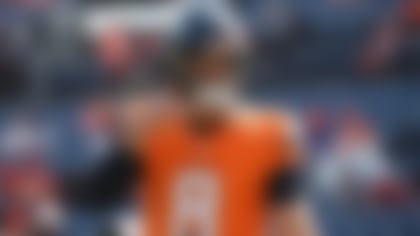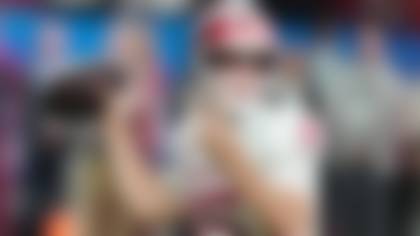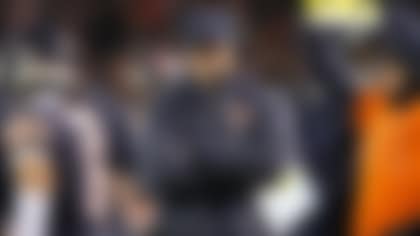Jakobi Meyers flashed a transcendent smile as he heard the phrase "last year." The 26-year-old wide receiver interrupted a reporter's question, excitedly slamming his fist on the lectern in front of him.
"I was waiting on it. I was waiting on it. Thank you," Meyers said at a news conference in March introducing him as a member of the Las Vegas Raiders, days after he signed a three-year, $33 million deal in free agency.
The it Meyers was waiting for: being asked about his role in one of the most notorious NFL gaffes in recent memory.
In Las Vegas last December, with three seconds remaining in a tie game between the Raiders and Patriots, New England called a draw to running back Rhamondre Stevenson, to run out the clock and head to overtime. Stevenson ran for 23 yards -- then lateraled the ball to Meyers, who was in his fourth season with the Patriots. Meyers quickly unleashed a backward lateral pass in the direction of trailing QB Mac Jones, which then-Raider Chandler Jones intercepted. Jones stiff-armed Mac Jones and ran it back for a game-winning 48-yard touchdown as time expired. The loss dropped the Patriots to 7-7. They finished 8-9, missing the playoffs by one game.
One Patriots blog dubbed it The Lunatic Lateral. The Fresno Bee, writing from the Raiders' point of view, titled it Sin City Miracle.
"That was our year in one play. It exemplified our 2022 season," Patriots receiver Kendrick Bourne told me last month. "Communication was an issue. We weren't on the same page. All we had to do was down the ball. Craziest play in NFL history to lose on. But what I'm proud of: We did a good job of sticking to our togetherness through the chaos."
The Patriots and Raiders are set to face each other again this Sunday, 301 days after that gaffe, on the same Allegiant Stadium field where it took place. There are many storylines tied to this matchup -- several Raiders, including Meyers, head coach Josh McDaniels and general manager Dave Ziegler, will face the team they once played or worked for, with the narrative of revenge likely to crop up in the media. (McDaniels said this week that that "horse is dead. We've beat it enough.") More importantly, both teams have an opportunity to turn around their respective seasons after slow starts.
As for Meyers, he is coming off a strong performance in the Raiders' Week 5 win over the Packers, totaling seven catches for 75 yards and a touchdown. Despite missing Week 2, he is on pace to shatter his previous personal bests in receptions, receiving yards and touchdowns. He has also discussed the game-ending gaffe in public, including immediately afterward and during that news conference in March. He declined an opportunity to be interviewed for this article.
But Meyers was not the first player to commit a gaffe like that, and he surely will not be the last. What does a player go through when he makes a split-second mistake that goes viral? How does a player push forward through the kinds of running jokes that threaten to linger long after one has retired?
'The ideal blooper play'
From Garo Yepremian's ill-fated reaction to a blocked kick in Super Bowl VII to Leon Lett's Thanksgiving blunder in 1993 to Mark Sanchez's butt fumble in 2012, NFL history is full of the kinds of gaffes that are today replayed endlessly on highlight shows or go viral on social media. Seemingly anyone can become a laughingstock, and short clips often do not make room for the context behind a mistake.
"My gaffe happened 15 years ago, and I hear about it just about every day," said Dan Orlovsky, a 12-year NFL QB who is now an ESPN analyst. "Five or six years ago, I started posting myself on social media breaking down plays. The overwhelming reaction was, 'You're the idiot that ran out of the end zone. Why would I listen to you?' I would respond, 'Yes, and it's my job to make you think of me differently. It's my job to prove myself over and over again that I'm worthy of your attention and time. I'm out to prove I'm way more than that football play.' "
Orlovsky's moment happened in the first quarter of his first career NFL start, on Oct. 12, 2008, when he was with the Detroit Lions. The Lions were backed up at their own 1-yard-line, and as Orlovsky recalls, Detroit coaches decided to call a one-route pass play out of shotgun, despite Orlovsky's objection. Orlovsky tried to escape pressure from Minnesota Vikings star defensive end Jared Allen by shuffling back and away -- until he inadvertently ran out the back of the end zone for a safety. Detroit lost, 12-10, the difference being the safety, en route to an infamous 0-16 season.
"It was wildly embarrassing when it happened. It's the ideal blooper play. It's a funny play," Orlovsky said. "I was unprepared for that moment. I made a bone-headed play. I never pointed fingers. There's nothing that is going to take away from an embarrassing play, but I was never embarrassed over it."
Orlovsky says he remembers the play with humor -- not sadness -- because of how his teammates reacted: They laughed at him. Lions receivers Calvin Johnson and Roy Williams waited until Orlovsky got to the sideline, then broke out in nonstop, uncontrollable laughter, Orlovsky said, for a lengthy amount of time.
Months later, after Orlovsky signed as a free agent with the Houston Texans, wide receiver David Anderson introduced himself to his new backup QB with a simple line: "I'm never going to let you live this down."
There were difficult moments initially for Orlovsky, especially as reminders of the play lingered, but he made a promise that he would use it as an example for his future kids, that you can "do stupid stuff, feel like the world is caving in on you and still move past it."
"I said, Dan, it's never going to get worse than that. Don't let it break you. Prove that you're tougher than that. Prove that you won't let it define you," Orlovsky said. "I always ran toward it. I always disarmed it by making fun of it myself. I played in the NFL for 12 years. I ran a 6.2 40 as a sophomore in high school. I couldn't bench 135 when I got to college. I never struggled to know who I was."
Nowadays, Orlovsky spends his time educating viewers on players' strengths and weaknesses while highlighting scheme nuances on ESPN's NFL Live and college football broadcasts. He's proud that more people know him as an excellent broadcaster than an NFL player, and every once in a while, he can joke when another QB repeats his end-zone mistake, like Indianapolis Colts QB Gardner Minshew did in Week 3 this season and Jimmy Garoppolo did last year.
Ultimately, Orlovsky's route to coping with his viral gaffe included leaning on his faith and not taking himself seriously. That is also the advice he'd give to Meyers or anyone else whose mistake goes viral.
"I don't think that play will ever go away," Orlovsky said. "But I accomplished more in my life than I ever dreamed. I've chosen to never look at the play in sadness."
'We can't let one play break us'
Kendrick Bourne took a deep breath last month as he began telling me about the 2022 Patriots season -- part of what he called the hardest year of his life.
Bourne said his own mental, emotional and physical struggles helped lead to a significant dip in production from what was a career-best 2021 season. New England also introduced a new offensive coaching staff, and Bourne says he was one of the Patriots players who struggled with the transition.
Ultimately, the Pats' offense disappointed, finishing 26th in total yards -- only the second time New England has finished outside the top 25 since Bill Belichick became head coach in 2000.
"The decision to go with Matt Patricia and Joe Judge leading the offense was questionable at the beginning. But it's hard as players; we don't call the shots. The whole group, we didn't mesh," Bourne said. "There wasn't a lot of discipline. We were one-dimensional, with few ways to confuse defenses. We didn't have a good scheme or variety. We should've been better. It was the coaches and players.
"That Raiders play you're talking about exemplified our 2022 season. It was a disastrous struggle. But how we reacted to it also exemplified our brotherhood."
Meyers had tears in his eyes and a red face as he spoke with reporters in the locker room after his shocking December lateral decision. He said he was "trying to do too much, trying to be a hero," despite a clear instruction in the huddle to run the ball, go down and get ready for overtime. Meyers deflected questions about Stevenson, who made a mistake with the initial pitch to him, and put it all on himself.
"That was a humbling experience as a man, as a football player, that was just tough," Meyers told reporters in March. "I knew what it meant to the team that I was on at the time, so it really hurt me. Because like I said, family is really big for me.
"When I went through it, in the moment, my heart was broken, you know. But days after, just seeing how guys kind of rallied around me, it built me up as a person."
As Bourne tells it, Meyers' second family stepped up. Several Patriots teammates, including Bourne, immediately became his support system, shielding him from criticism and giving constant encouragement.
A few gave a hug. Others offered advice. And many just simply told him: We got you; it's not all on you.
"If we make a field goal, no Jakobi lateral. If 'Mondre doesn't pitch the ball, Jakobi doesn't make his throw. If we were pointing fingers, maybe he can't move on," said Bourne, who leads the 2023 Patriots in receiving yards. "Some players may never move on from that situation. I've gone through my personal and team struggles. Players stick together.
"We're on our phones. We see all the negativity. The way we cope with it is sticking together. We can't let one play break us."
There were cruel social media insults, jokes and criticisms. Meyers and the Patriots were ridiculed on TV. But then, six days later, Meyers responded with one of his best games: six catches, 83 yards and a touchdown. Afterward, Meyers expressed gratitude for the lessons he learned over the previous week.
"Craziest play in NFL history to lose on. But what I'm proud of: We did a good job of sticking to our togetherness through the chaos." -- Kendrick Bourne
On Sunday, for the first time, Meyers will face the team with which he broke into the NFL as an undrafted free agent in 2019. He led the Patriots in receiving yards in 2020, 2021 and 2022, demonstrating separation ability, route running and blocking in the run game. Meyers has said he was interested in re-signing with the Patriots once he hit free agency in March, but ultimately he ended up with the Raiders. He also has noted that he was disappointed that he couldn't say a proper goodbye at the end of his New England tenure.
Shortly after Meyers signed with Las Vegas, the Patriots signed receiver JuJu Smith-Schuster to a deal that was similar to what Meyers received from the Raiders, prompting Meyers to tweet: "Cold world lol." (Meyers later said he was "being childish" with regard to the tweet.)
"Free agency is a process. It wasn't a trade. It wasn't planned that way. It worked out that way," Belichick told reporters when asked about the Meyers and Smith-Schuster decisions at the Annual League Meeting in March. Speaking with reporters this week, Belichick said Meyers "was a priority" in the offseason, and that Meyers and the Patriots got "relatively" close in talks, but the coach reiterated that Meyers "was a free agent and signed with the Raiders."
So far, the Raiders have been on the better end of those free agency decisions. Meyers has 25 catches for 274 yards and three touchdowns in four games. Smith-Schuster has 14 catches for 86 yards and zero touchdowns in five games, and the Patriots' offense has gone through early struggles.
Whether fair or not, Meyers surely will be reminded of the viral mistake that defined the last Patriots-Raiders game. He is in a new uniform and playing better than he has before. But there seems to be one element of his previous experience he plans to carry with him. As he said in March:
"Now I know, whenever one of my teammates mess up, who I want to be in that situation. How I want to help them, what type of love, what type of support I want to give."












